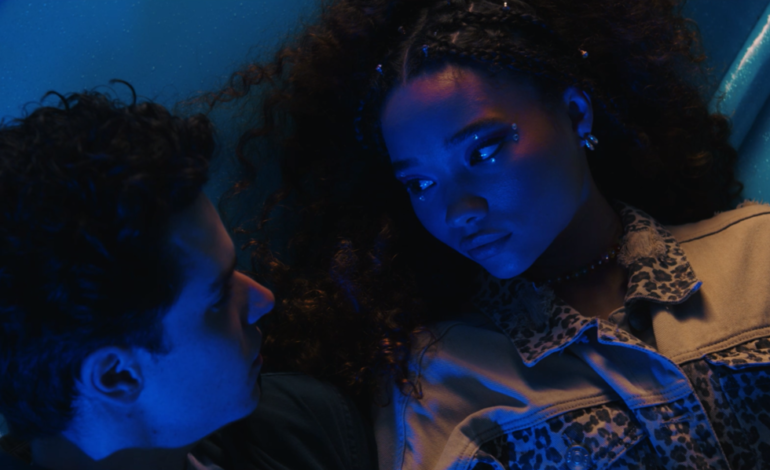

In this episode of I Know What You Did Last Summer the police are proven to be just as useless as they are in real life which results in two heartbreaking deaths and a strange ending that throws the entire show into question.
This episode picks up after the events of the previous one, going back and chronicling what happened to Allison† (Madison Iseman, Annabelle Comes Home), Margot (Brianne Tju, Light As a Feather), and Riley (Ashley Moore, Popstar: Never Stop Never Stopping) when they all split-up to escape Clara (Brooke Bloom, The Sinner), though it’s not shown fully what happened to Allison† after she cut her hand on the barbed wire fence, as the only two of the four fully shown to have successfully gotten out were Margot and Riley.
Though it’s hard to describe anything that happened to Riley as “successful.”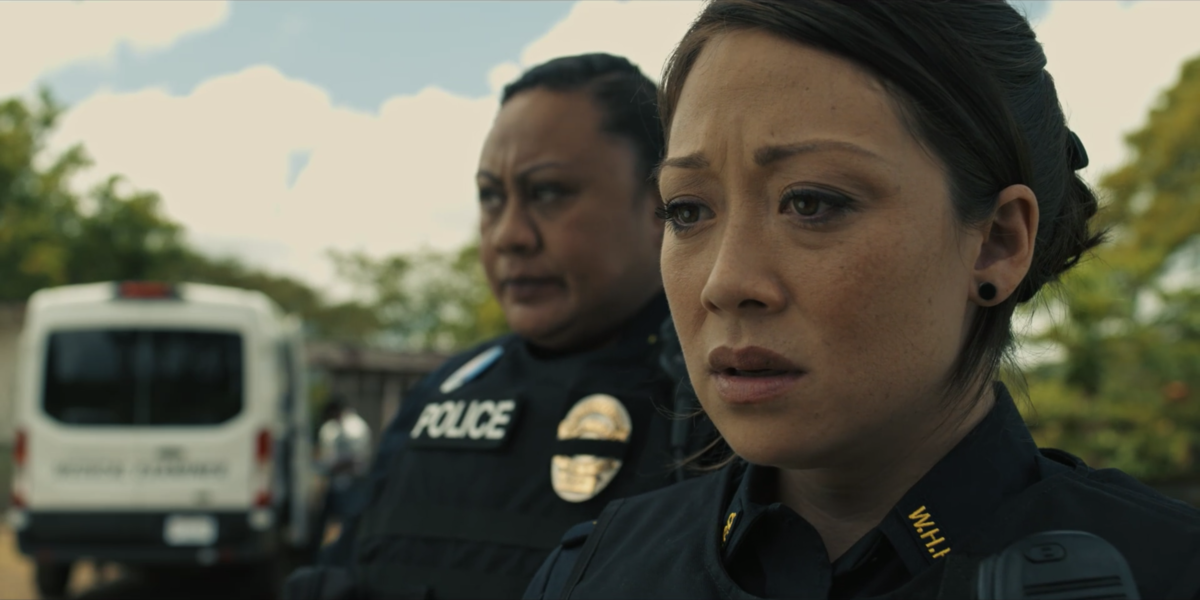

Another Riley-centric episode, it reveals even more about what happened that night and confirms her love for Dylan (Ezekiel Goodman, Rat Bastard) that she has constantly denied. It also explains why she’s so guarded, having worked so hard to act like sex with Dylan is no big deal and that she’s not in love with him to the point where it’s obvious she is, as well as her reactions when it came to Johnny’s death and the very standoffish way she approached all that had happened.
As was made clear before, Riley didn’t have an easy time growing up. Courtney (Cassie Beck, Connecting…) definitely isn’t mother of the year, and Riley had to grow up early on in order to take care of both herself and her mother who was the only source of income for the two of them, which is probably why Riley started dealing drugs, as Courtney had been seen asking her daughter for both drugs and money.
As was seen with Doug back in episode three, Riley definitely faced racial and economic profiling from the police and learned early on that the only person she can truly rely on is herself, and after being bullied for being poor, she’s made it her mission to stay strong under it all and come out on top.
This hard exterior isn’t all she is, however, as there’s still a part of her that’s very vulnerable, at least by her standards; for the standards of everyone else, it’s a pretty normal level of trust.
While her reaction after Dylan left the bouncy house that night is a perfect example of her rough exterior hiding a deeply emotional girl who craves the love and support her mother didn’t give her, there were other, more heartbreaking, scenes, even during that same night.
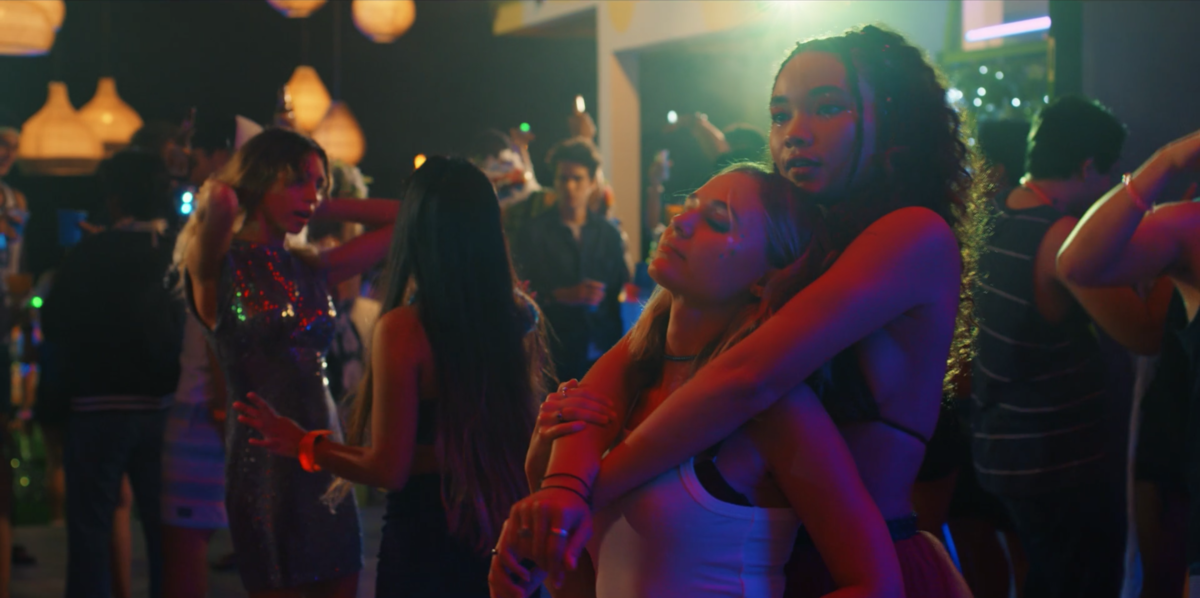

The scene in question is when Lennon finds Riley and convinces her to take her jacket off and dance with her; she also made a comment about Riley’s breasts, which backs up why they were so suspicious about Allison† acting differently because she hadn’t commented on them nearly enough.
It’s clear that Riley, while more than happy to dance, doesn’t feel immediately inclined to let loose the way Lennon and Margot had back at the start of the party when they were dancing for TikTok. It’s only when Lennon ropes her into it with Dylan as incentive that she actually goes along with it and starts to feel comfortable. It’s never stated why, but considering the context clues it’s not hard to believe that Riley has been the victim of nasty comments demeaning both her and sex work, what with the various comments society often makes about women in need of money.
When a jealous Margot calls her over, Riley bounces over, feeling safe enough with her friends to be as relaxed as they are. Unfortunately, this one instance where she’s not completely on guard is the same one where Margot’s jealousy and desperation gets the best of her, telling Riley she “looks like a legit ho” at the moment, but is only telling her because she loves her. Riley, who had been having a good time and probably respects sex workers, stumbles before continuing on as if Margot’s comment wasn’t a slap in the face of her short-lived comfort.
It’s interesting to see how both Margot and Riley lashed out at the party due to their respective unrequited loves, it’s heartbreaking that they were driven further apart rather than coming together to give each other support.
What’s more heartbreaking than anything that happened at the party, however—and arguably more heartbreaking than one of Riley’s last thoughts being what had happened at the bouncy house—was when she was first attacked right after escaping Clara’s.
It all starts when she first sees the black truck. She once again let her guard down and trusted other people, so relieved at the thought of being able to turn to someone for help, only to be literally punched in the gut—or hit, since it was the car—when her would-be savior is nothing of the sort.
But nothing compares to her phone call to her mother.
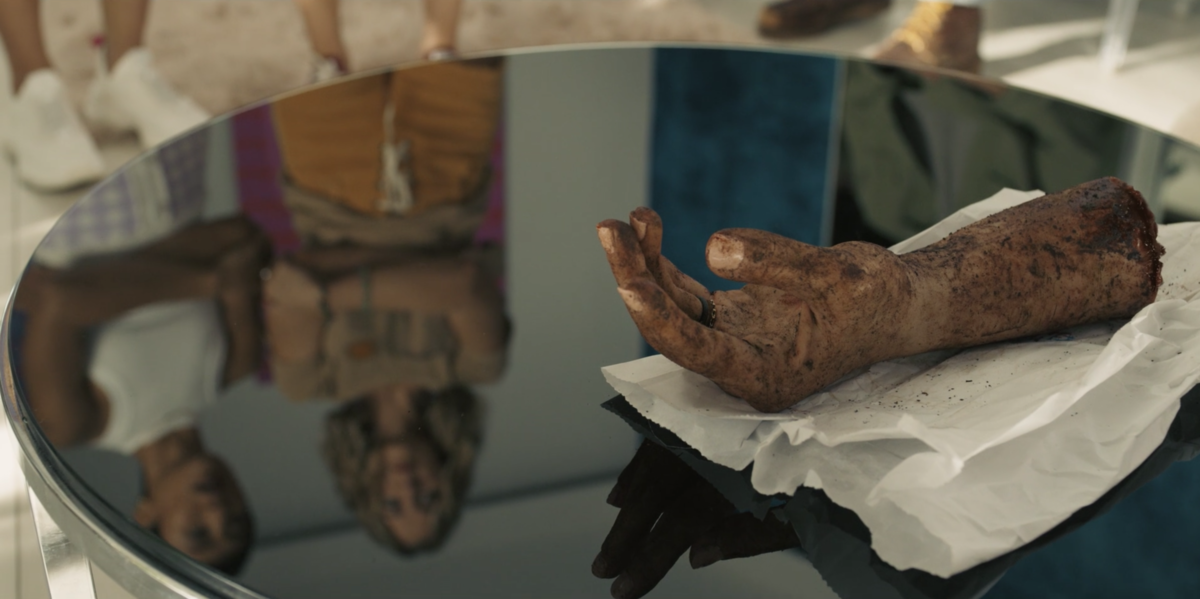

It’d been established from episode one that Riley and her mother are estranged and, while they live together, their relationship is very distant, as if they were distantly related, and Riley has never reached out to her mother for help, looking surprised when Courtney came over to stop Doug from harassing her.
Despite all of this, her first instinct when in danger was to call her mother. Not Dylan or the others in the same area, not the police, but her mother. Just like any child would, she sought out comfort and protection from her mother, the person she’s subconsciously wired to cling to, regardless of what her conscious mind may have had to learn.
Watching Riley cry for her mother to help her, only for Courtney to hang up, was beyond painful, and was probably more painful than the stab in the chest she subsequently suffered.
References to other iconic slasher movies are to be expected, especially of a slasher remake, but the Scream reference when Riley reached out for the tree branch but couldn’t reach it in time was a fun homage, especially since they added a unique flourish with the killer cutting off her arm, as well as Riley actually surviving the attack.
The remaining trio do reference experiences others have had where they’ve lost limbs but survived, and there have been people who have survived brutal stabbings that could have very well killed them, but it’s a wonder she didn’t bleed out from the wounds in her chest and arm, as well as whatever internal damage was caused by being hit by the car; this also brings into question whether Lennon had actually died after being hit by the car, but every situation is different, and she didn’t die of drowning according to the M.E., though they may not have done an autopsy.
Regardless, Riley surviving was a great twist, but the false hope was only there to make her real death hurt all the more.
This theme of being let down when at the most vulnerable continues through the entire episode.
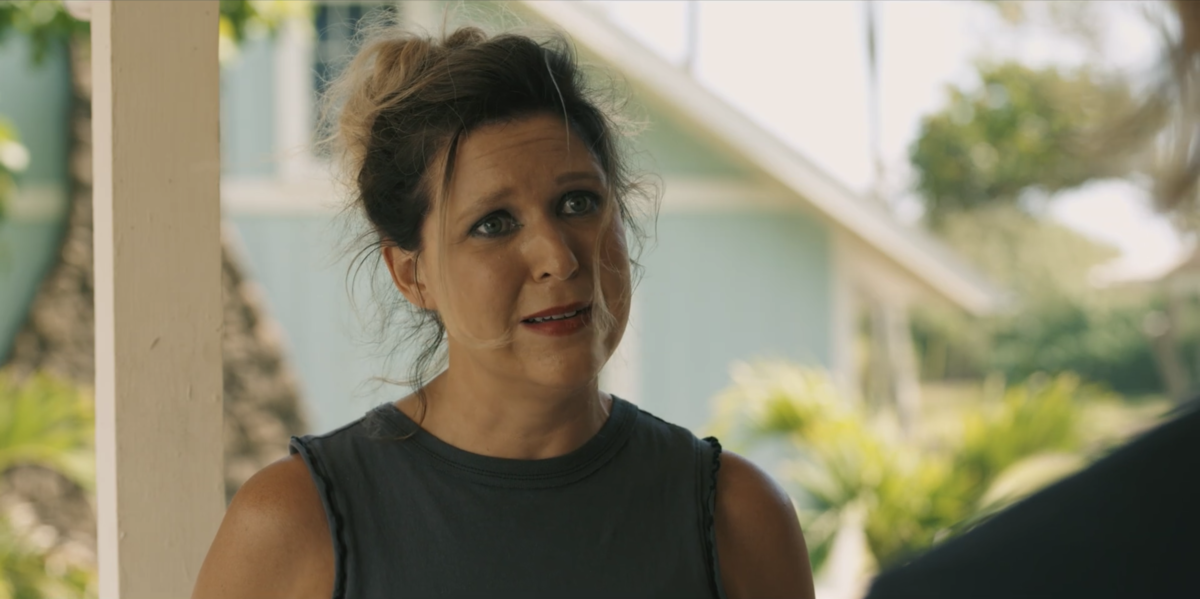

It’s important to note that, despite severely dropping the ball initially, Courtney stepped up and showed a maternal side to her that gives a new perspective of her relationship with Riley. Rather than being purposefully neglectful—though she definitely was—it seems that this was less out of disdain or disregard for her child and more so that she wasn’t prepared or equipped to have a child and didn’t have support of her own in order to do what she needed; it’s a cycle that made Courtney both a victim and an enabler.
Courtney, however, is herself let down when she puts aside her personal grudges and asks Lyla (Fiona Rene, Stumptown), the police chief, for help.
The way everyone responds to the news that Riley is missing proves the system is broken, as they dismiss the concern right away despite a murderer being on the loose; their non-existent profile shouldn’t affect what leads they do and don’t follow-up on. Not only that, but the intersection between Riley’s race and socioeconomic status makes it clear that, even in small towns where everyone knows everyone, the police couldn’t care less when a poor person of color goes missing. Despite not having the same reputation that her mother has, everyone just thinks she went out to party and hasn’t come home or did something irresponsible, because they can’t fathom someone “like that” could be the victim of anything more than their actions.
Courtney’s frustration with the police was truly felt, and while Bruce (Bill Heck, Locke & Key) would later be on the other side, he actually does provide Courtney even a fraction of support; he doesn’t take her seriously at all, but when she talks about her maternal instinct that something is wrong with her baby, and shows genuine concern, he can’t help but relate.
Of course, while he can definitely attest to feeling powerless when his child is in danger, that doesn’t change the fact that Allison’s† rage and betrayal is completely justified when he reveals the truth about what happened to her mother.
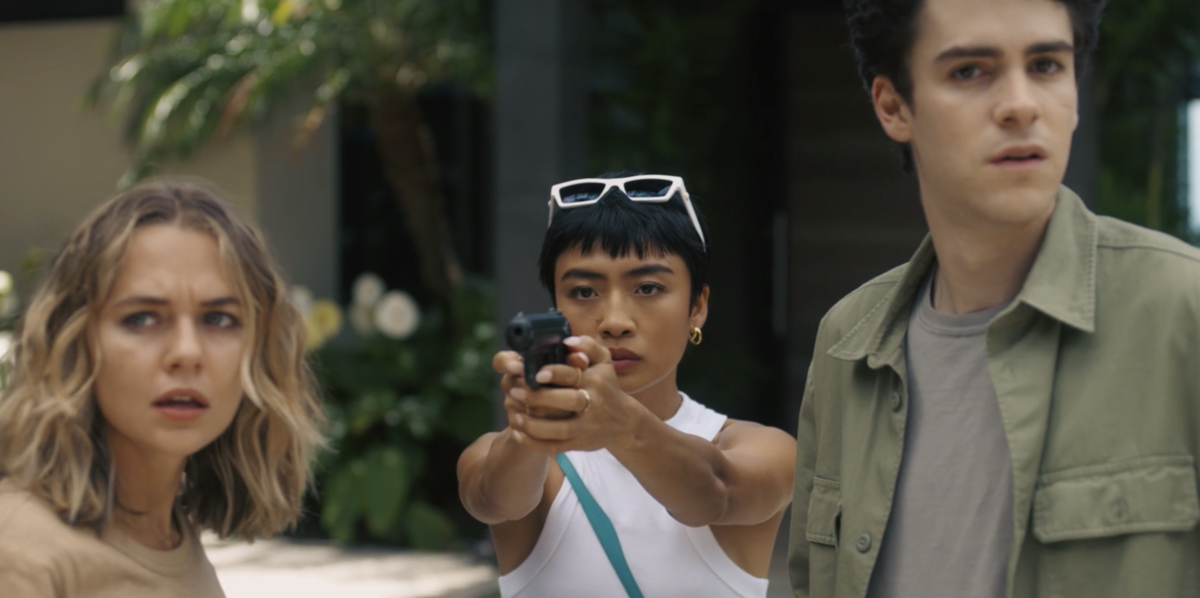

Truthfully, though, while it was already messed up enough that he let one twin know what happened but not the other, the fact that he looked at the faces of his eight-year-old daughters and thought telling them their mother died, forcing them to become aware of mortality and the concept of suicide and all the emotional suffering that entails, was better than just telling them that their mother fell in love with someone else and left is completely idiotic. Thousands of divorced parents can attest to the fact that the truth is way easier and less damaging; sure, they may have abandonment issues and insecurity about being loved, but at least they don’t have to be emotionally traumatized for no reason.
But while Bruce’s revelation was a bombshell—hopefully one that winds up being yet another lie, because…wow—the biggest bombshell, to an extent, is the last scene when Dylan goes back to the cave.
It was pointed out in the first episode that some of the names in the cave were carved by someone other than the person who had died, and after seeing him carving in names two separate times, it could very well be that Dylan has been carving them since he was a kid.
Whether or not that theory is true, there’s definitely more to Dylan and Clara’s relationship to each other and the cave, as their interaction after she brings Riley’s body into her honey-covered room was not as hostile as it should have been.
That being said, Dylan has been referenced as having OCD and/or ASD, and while that doesn’t mean he can’t feel emotions or react to situations, his reaction could have simply been a delay or his way of holding back his fury in order to get enough evidence to expose Clara as the serial killer.
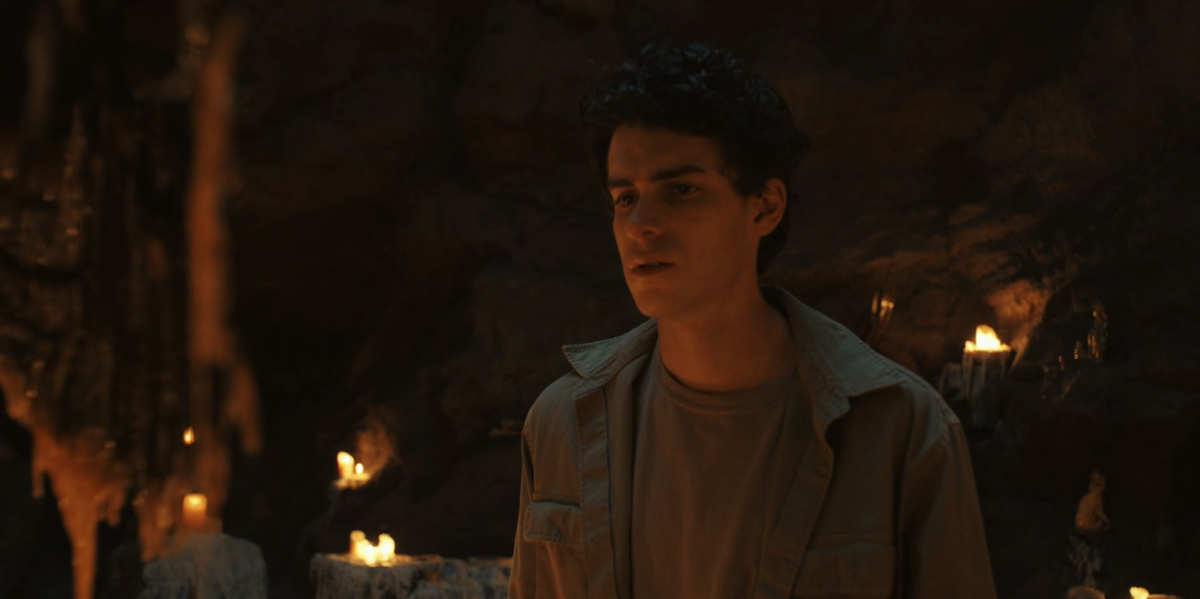

But while it could very well be that Dylan isn’t actually working with Clara—nothing is ever as it seems in this show, and he had been set up as suspicious to begin with which makes him seem unlikely—it’s still important to note that he was never shown leaving Clara’s place. Everyone else was shown escaping, even parts of Allison’s†, but Dylan was never shown to escape.
In fact, he had told the others to leave and threw himself into the line of fire, yet came out generally unscathed hours later. Also, while him shushing the goat when he was hiding could’ve just been for comedic effect, it could be that the goat knew him and recognized him; a goat had come out of the woods to enjoy his salt licks, it could be the same one.
No matter what’s true or false, this episode raised so many questions and created so many theories, and with only two episodes left, it won’t be long before the truth is finally revealed; unless, of course, it never is.
Rating: 8.75/10
